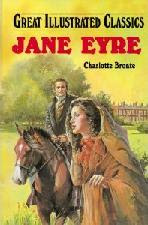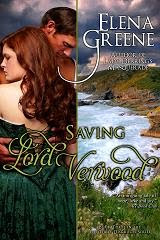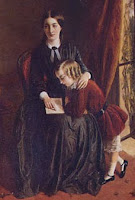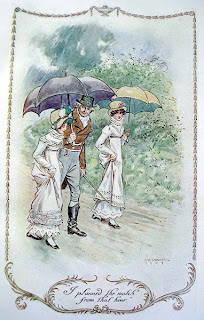Happy Columbus Day here in the USA.
Of course, in the Regency, the British didn’t celebrate Columbus Day, so for once a Monday holiday does not give me a blog topic.
Now, if I my blog would have been last Friday, I would have had a ready-made topic. Friday was Jane Eyre Day, the anniversary of the release of Jane Eyre in 1847, under the pseudonym Currer Bell. Just Saturday a week ago, Megan asked us all about our favorite movie version of Jane Eyre. If Megan could anticipate Jane Eyre Day, then maybe I can celebrate it after the fact.
I remember reading Jane Eyre when I was a girl. Athough it was not and never has been a favorite of mine, it is a story that has always stayed with me. I mean, who could forget the interrupted wedding day when, at the altar, Jane learns that Rochester has a mad wife in the attic? All the gothic spookiness of the fire and Grace Poole then makes great sense. Or the message wafting telepathically from Rochester to Jane? Or the miraculous cure of his blindness?
Unfortunately, I also remembered that Jane fell in a ditch and quite amazingly wound up on the doorstep of cousins and discovered she was an heiress (not exactly how it happened in the book, but that was how I remembered it). Even as a dreamy, romantic kid, I felt that was too contrived. I also thought that Rochester was much too mean to Jane and I never understood why she fell in love with him.
But, even all that stayed with me through the years until I read the book again and watched countless adaptations. That proves Jane Eyre’s greatness as a novel, in my mind. It is unforgettable.
My next book, Born To Scandal, coming to bookstores Nov 13 and as an ebook Dec 1, is an homage to Jane Eyre. It also is a story of a tortured hero who hires a governess with her own troubled past. It is also full of secrets.
On Friday, Jane Eyre Day, a quote appeared in my email (I’m signed up for a daily Inspirational Quote) that could have been the motto for my book:
“Life appears to me too short to be spent in nursing animosity or registering wrongs.” — Charlotte Bronte.
It is a quote from Helen Burns to Jane. Helen was my favorite character in Jane Eyre, especially as personified by the child Elizabeth Taylor in the 1943 movie version.
What is your favorite quote from Jane Eyre or your favorite part of the story or your favorite character? How did you celebrate Jane Eyre day and how are you celebrating Columbus Day?










